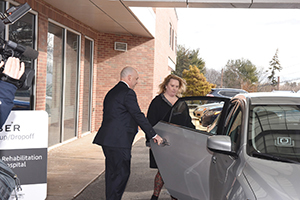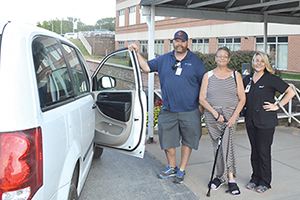By KATHLEEN NELSON
The problem is a long-standing one: an estimated 3.6 million Americans miss medical appointments each year because they lack access to quality public transit or don't have a car. That's according to a U.S. Bureau of Transportation Statistics study published in 2005, which said transportation challenged patients are more likely to be older, poorer and to have a higher disease burden than the general population.
The National Institutes of Health estimates that missing routine or follow-up appointments can lead to emergency room visits or hospital stays that cost about $150 billion annually.
The emergence of ride-sharing services and improvements in scheduling nonemergency medical transport are giving health care providers new tools for dismantling transportation barriers to health care. Some are tailoring transportation solutions for patients with chronic conditions who require regular health care appointments. Some cater to urban seniors, others to cancer patients in rural areas. Some ministry members subsidize the nonemergency medical transportation services for low-income patients.
Each approach is showing early promise for reducing missed appointments, which leads to cost savings and improved health outcomes.

Dr. Robert Krug, president of Mount Sinai Rehabilitation Hospital in Hartford, Conn., escorts Stacy St. Pierre of Tolland, Conn., to an Uber ride for an MRI at a sister facility, Saint Francis Hospital in Hartford. Both hospitals are part of Trinity New England, which offers free Uber service to shuttle select patients who require services at both centers. All patients can schedule rides with Uber to and from the campuses through the hospitals’ websites.
Trinity Health New England
Simplified logistics
St. Vincent Charity Medical Center in Cleveland launched a program in the spring to provide free transportation via the ride-sharing company Uber to patients undergoing addiction treatment in the hospital's Rosary Hall Intensive Outpatient Program. Patients attend four, three-hour sessions weekly, as well as individual counseling sessions, during the first five weeks of recovery. The door-to-door Uber service saves clients in early recovery the stress of coordinating bus schedules and transfers to arrive on time.
Between June and September, 30 new clients logged 507 Uber rides, and 29 clients achieved 100 percent participation in the group and individual counseling sessions. In the 30 days before launch, Rosary Hall had 76 percent client participation in group sessions and 62 percent client participation in individual counseling sessions. Because of its success, the transportation program has earned additional funding from the Alcohol, Drug Addiction and Mental Health Services Board of Cuyahoga County. Rosary Hall hopes to provide 228 new clients Uber transport within the first year.
To schedule the rides, St. Vincent staff and patients use a HIPAA-compliant Internet and mobile platform from Circulation, a Boston-based start-up that facilitates nonemergency medical transportation.
Robin Heffernan, Circulation's chief executive, said that since launching in December, the company has signed up 56 clients representing 1,100 health care facilities nationwide. In addition to St. Vincent, Circulation also works with Roper St. Francis Healthcare in Charleston, S.C., a system that includes Bon Secours St. Francis Hospital; and three acute-care hospitals and a Program of All-inclusive Care for the Elderly, which are part of Trinity Health's Mercy Health System of Southeastern Pennsylvania.
Here's how it works: Physicians, nurses and staff at health care facilities log into Circulation, look up a patient's name and schedule transport. To determine the appropriate vehicle to dispatch, the system prompts the booker with questions about the patient's physical limitations and requirements, such as a need for help getting into or out of a vehicle or for wheelchair assistance. (Some regular Uber cars can transport wheelchairs and scooters, and cars with lifts are available in select markets. Uber has a training video for drivers assisting people with disabilities.) The scheduler notes if the patient is hearing or vision impaired, and whether he or she will be traveling with a caregiver. Circulation sends reminders to both patients and their caregivers about upcoming appointments.
Circulation has an exclusive agreement with Uber and offers rides in standard Uber vehicles in all its markets. Heffernan said select markets also offer transportation for nurses to and from home and health visits and UberACCESS service, with vehicles that accommodate wheelchairs and technology to support passengers with limited vision or hearing. Uber rates vary for each level of service. ACCESS is costlier, though Heffernan said some fares are paid by Medicare, Medicaid, other insurers or the health care facility.

After her appointment at Mercy Hospital Jefferson in Festus, Mo., Christine McKinney gets a ride home in a van dispatched by the medical transport system developed by SafeRide Health. With her are driver Todd Smith and Mackenzie Vernon, a Mercy co-worker who coordinates nonemergency medical transport for patients with transportation challenges and conditions that require frequent treatment.
Mercy
Buddy system
Chesterfield, Mo.-based Mercy has developed a successful pilot program using a platform from SafeRide Health. It's employed by facilities affiliated with Mercy Hospital Jefferson in the small city of Festus in rural southeast Missouri. Caseworkers use SafeRide to schedule door-to-door transportation to Mercy Hospital Jefferson's oncology infusion center, wound center and congestive heart failure clinic, "places where people need multiple rides, often multiple rides per week and their schedule is never stable," said Ron Finnan, director of operations for Mercy Clinic Jefferson. He added that the pilot program also has replaced discharge rides provided by ambulance, which had been used when a patient had no one to provide a ride home and can cost as much as $2,000.
The Mercy Jefferson program uses a dozen wheelchair lift-equipped vehicles from ZipCare, a non-emergency medical transportation company based in St. Louis. All drivers are Basic Life Support certified and carry emergency equipment with them on every call.
Through the SafeRide platform, the patient receives reminders a day and an hour before the appointment. And, when a patient calls to cancel an appointment at Mercy Clinic Jefferson for lack of transportation, an office manager encourages the caller to keep the appointment by offering to dispatch a driver for the round-trip travel.
SafeRide also has improved "batching," by scheduling patients from the same town for services at the same time so they can share rides. "The interesting thing is that the patients form a strong bond and help each other get through treatment," Finnan said. "If one says he can't make an appointment, the other might say, 'Don't make me ride by myself.' The peer pressure helps, too."
Mercy Jefferson has used SafeRide for 1,500 rides since February and is paying all expenses. Finnan said each ride costs about $72. The program has proven cost-effective, saving an estimated $270,000 since February on what Mercy would have paid for ambulance transport on discharges and a decrease in rehospitalizations. The program has also cut no-shows in half.
"We looked at this for both cost savings and keeping people out of the hospital," Finnan said. "If a patient misses an infusion or hyperbaric oxygen treatment, what are the chances of (hospital) readmission? It's pretty significant. So this is worth it."
Finnan said the program would expand soon to Mercy's hospitals in the rural and exurban cities of Washington and Troy, Mo., and that SafeRide could be in place throughout the entire system by 2018.
Pickup and drop-off zones
Some ministry members have formed direct partnerships with Uber or Lyft. Neither ride-sharing company would disclose its health care client lists.
Trinity Health of New England has pinpointed pickup and drop-off locations exclusively for Uber riders to and from its five hospital campuses in Connecticut and Massachusetts that can be selected on the Uber smartphone app so the driver knows exactly where to deliver or meet a patient. Uber rides also can be scheduled through each hospital's website. Trinity offers first-time users a discount of up to $20.
"We struggle with getting patients to appointments because they don't have a ride or depend on someone who works full time during the day," said Claudio Capone, Trinity Health of New England's regional vice president of strategic planning and business development. "Uber is relatively inexpensive, cheaper than most cab rides, and they service a larger area."
Trinity also uses Uber to transport select patients from its Mandell Center for Multiple Sclerosis in Hartford, Conn., for services at nearby Saint Francis Hospital and Medical Center. Capone emphasized, however, "We're adamant that people know that, at this time, Uber can't be responsible for people who need medical assistance walking or with a wheelchair."
Prescheduled or on-demand
St. Louis-based Ascension was the first health care system to form a partnership with Lyft. Since February, Ascension has put agreements in place in 21 of its markets, and Lyft has provided more than 8,000 rides.
Chris Young, Ascension's vice president of innovation, said Ascension pays for or subsidizes the service for "existing patients of an Ascension ministry who have a need for discounted or free transportation to obtain nonemergency, medically necessary services."
Ascension staff members use Lyft's concierge platform to schedule the rides.
Broomfield, Colo.-based SCL Health announced last month that it is collaborating with Lyft to make nonemergency on-demand or scheduled transport available to its vulnerable patients living in the front range of the Rockies near Denver. Peter Kung, SCL Health's vice president of innovation and virtual health, said, "Helping patients get to or from our clinics and hospitals is a simple and critical step in improving health outcomes."
Copyright © 2017 by the Catholic Health Association
of the United States
For reprint permission, contact Betty Crosby or call (314) 253-3490.